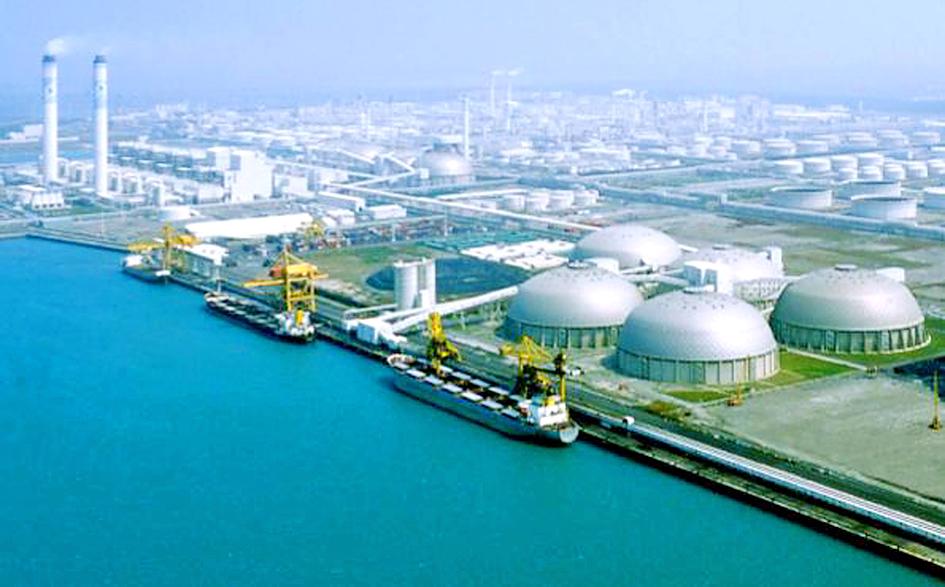Nine local independent power producers were found guilty of concerted practices by the Supreme Administrative Court on Monday as it overruled previous rulings in a drawn-out fair-trade case.
The court sided with the Fair Trade Commission, saying in its verdict that the joint action of the power firms — which account for 76 percent of state-owned Taiwan Power Co’s (Taipower, 台電) outsourced electricity — had prohibited normal market competition, disrupting supply and demand.
The nine firms, which have provided electricity to Taipower since 1995 to help ensure stable supply, were jointly fined NT$6.32 billion (US$212.74 million at the current exchange rate) by the commission in 2013 for colluding on pricing.

Photo: CNA
The firms — Mailiao Power Corp (麥寮汽電), Ho-Ping Power Co (和平電廠), Ever Power IPP Co (長生電力), Chiahui Power Corp (嘉惠電力), Hsin Tao Power Corp (新桃電力), Star Energy Corp (星能電力), Sun Ba Power Corp (森霸電力), Kuang Power Co (國光電力) and Star Buck Power Corp (星元電力) — petitioned the commission in 2014 and the fine was reduced to about NT$6 billion.
The independent companies from 2008 to 2012 colluded to stay out of negotiations with Taipower over pricing adjustments, constituting concerted practice and resulting in a negative impact market functions, the court said.
The companies appealed to the Taipei High Administrative Court, with further trials and retrials resulting in rulings in their favor because the evidence failed to prove concerted practice, it said.

SEMICONDUCTORS: The firm has already completed one fab, which is to begin mass producing 2-nanomater chips next year, while two others are under construction Taiwan Semiconductor Manufacturing Co (TSMC, 台積電), the world’s largest contract chipmaker, plans to begin construction of its fourth and fifth wafer fabs in Kaohsiung next year, targeting the development of high-end processes. The two facilities — P4 and P5 — are part of TSMC’s production expansion program, which aims to build five fabs in Kaohsiung. TSMC facility division vice president Arthur Chuang (莊子壽) on Thursday said that the five facilities are expected to create 8,000 jobs. To respond to the fast-changing global semiconductor industry and escalating international competition, TSMC said it has to keep growing by expanding its production footprints. The P4 and P5

DOWNFALL: The Singapore-based oil magnate Lim Oon Kuin was accused of hiding US$800 million in losses and leaving 20 banks with substantial liabilities Former tycoon Lim Oon Kuin (林恩強) has been declared bankrupt in Singapore, following the collapse of his oil trading empire. The name of the founder of Hin Leong Trading Pte Ltd (興隆貿易) and his children Lim Huey Ching (林慧清) and Lim Chee Meng (林志朋) were listed as having been issued a bankruptcy order on Dec. 19, the government gazette showed. The younger Lims were directors at the company. Leow Quek Shiong and Seah Roh Lin of BDO Advisory Pte Ltd are the trustees, according to the gazette. At its peak, Hin Leong traded a range of oil products, made lubricants and operated loading

The growing popularity of Chinese sport utility vehicles and pickup trucks has shaken up Mexico’s luxury car market, hitting sales of traditionally dominant brands such as Mercedes-Benz and BMW. Mexicans are increasingly switching from traditionally dominant sedans to Chinese vehicles due to a combination of comfort, technology and price, industry experts say. It is no small feat in a country home to factories of foreign brands such as Audi and BMW, and where until a few years ago imported Chinese cars were stigmatized, as in other parts of the world. The high-end segment of the market registered a sales drop

Citigroup Inc and Bank of America Corp said they are leaving a global climate-banking group, becoming the latest Wall Street lenders to exit the coalition in the past month. In a statement, Citigroup said while it remains committed to achieving net zero emissions, it is exiting the Net-Zero Banking Alliance (NZBA). Bank of America said separately on Tuesday that it is also leaving NZBA, adding that it would continue to work with clients on reducing greenhouse gas emissions. The banks’ departure from NZBA follows Goldman Sachs Group Inc and Wells Fargo & Co. The largest US financial institutions are under increasing pressure